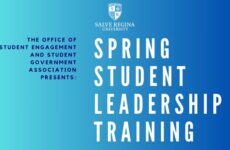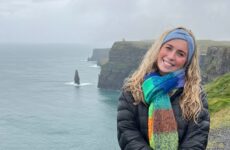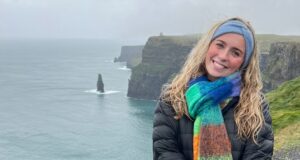By: Jackie Tierny | Staff Writer
Packing a bag with all of your latest necessities. Arriving at the airport a few hours early. Making your way through security. Rushing to arrive on time to your gate. Scanning your boarding pass and realizing yes, you really are doing this. These are just a few of the simple pleasures and for some, anxieties that come with travel.
For a college student, this may seem like a daunting task to take on, the thought of leaving the country, and navigating the world on your own for the first time. Luckily, students at Salve Regina University have Erin Fitzgerald, the director of The Center for Global Education and Fellowship. It is at this center that she works tirelessly to help students navigate their way in and out of the U.S., to experience new cultures and see the world through a new lens.

Q: Just starting out, could you give a brief synopsis of your job title and what you do here at Salve?
A: I am the director of The Center for Global Education and Fellowship. And so, essentially, I oversee just about anything that has to do with internationalization of the university, like the movement of people across borders for the purpose of education and cultural exchange… as well as programs for incoming international students, outgoing study abroad students, and fellowships.
Q: Great! And what led you to this career path?
A: Well, first of all, I studied abroad as an undergraduate, English literature and philosophy double major in London. It was my first time being abroad and that sort of gave me the bug, the travel bug. But, in graduate school, I took an opportunity to teach in Sweden. I was supposed to go for one year, to teach composition, like freshman composition, public speaking. I ended up staying for seven. So in that capacity, I shifted from being a teacher to overseeing a small campus which was accepting U.S. students there to study abroad, in Gothenburg, Sweden. I got more into kind of international student services, study abroad, and by the time I came back stateside I was kind of more on the administrative side of academia, and specifically, in the international realm.
Q: What is the most rewarding part of this job for you?
A: I mean, if I answered this question ten years ago, I definitely would have said listening to the students who’ve come back from study abroad, how their lives have been transformed, and that would’ve been my answer then. But now, I’ve also been working a lot with international students from crisis zones: Syria, Afghanistan, Ukraine. I’d say working with them and learning from them is the best part. But definitely the students, I’d say the students are the best part of the job.
Q: When I was doing some research beforehand, I saw you had another interview with UARRM [University Alliance for Refugees & At-Risk Migrants], and it was about the scholarship program we have here for refugees. Is that similar to what you were discussing?
A: Exactly, so we’ve been hosting students from Syria specifically, starting in 2013, one to two a year. Now just recently in the past year, we’re building on that existing program, and we’re kind of joining a larger consortium of universities that are getting prepared to kind of help rebuild the American refugee system by positioning universities to sponsor incoming refugees. So at Salve, fingers crossed, will have our first four students who are coming into the U.S. in refugee status who will be enrolled here as transfer students, so very talented students, but they’ll be living here on campus, and you know in that difficult situation of having been displaced from their home country, to a second country, and now a third country in the form of the US. So yes, that’s the project and I’ve been involved for the past two years.
Q: I also wanted to ask a bit about your personal travel experience which you had touched upon a bit earlier. When did you study abroad?
A: It was undergrad, and my university had what they call the London program for primarily English majors, but not only English majors, and that was–gosh 1987– because I’m so old! I was a junior, and I come from a really big family, here in Rhode Island. I was the first in my family to go abroad in that way. My mom was Canadian, so we had a connection Northwards. And then from there, my parents, other family members, are now quite widely traveled especially since I lived abroad for quite a long time, and also my work has brought me around the globe.
Q: What would you say is your favorite place that you have traveled to?
A: Sweden, absolutely. I love everything about Sweden. The landscape, the people, the politics, except for right now they’re taking a little bit of a rightward turn– but, when I was there! The social system, yeah.
Q: What piece of advice could you give to a Salve student who either just started out in travel, is about to graduate or just someone who is curious about travel?
A: Well I mean the first thing I would say is, especially for students who have studied abroad, as you are entering your senior year, you should be looking at graduate school abroad– its cost effective, good quality, attainable, and then fellowships like Fulbright, Peace Corps, other teaching of english programs are available globally. There are just a lot of opportunities which can be one or two year opportunities that can be a great way to get abroad. Again it’s cost effective, but also productive, and developing yourself still academically and professionally.
Q: How do you think traveling and having seen so many parts of the world has impacted your own belief system and worldview of how you wake up and look at the world everyday?
A: Well I think it doesn’t sound obvious, but when you do travel you have a better sense of our own country. Our own culture and the pros and cons of them. Being an American and living in America. So I think if you travel to a developing country, or a country in crisis you can see how much is very positive here in the US. But if you spend, say, seven years in Sweden you can see, well geez! There’s a lot of possibilities of things we could be doing a lot better! But, I think that’s it, it kind of crystallizes, you wake up and you’re just able to see things from multiple
perspectives more easily. Because you have traveled abroad and pulled yourself out of this environment and put yourself into this new environment and tried to interact with the people, and cultures of those places. That’s what I think, I think it makes your brain a bit more nimble, in shifting perspectives, in that way.
Photo Credit: Pixabay













